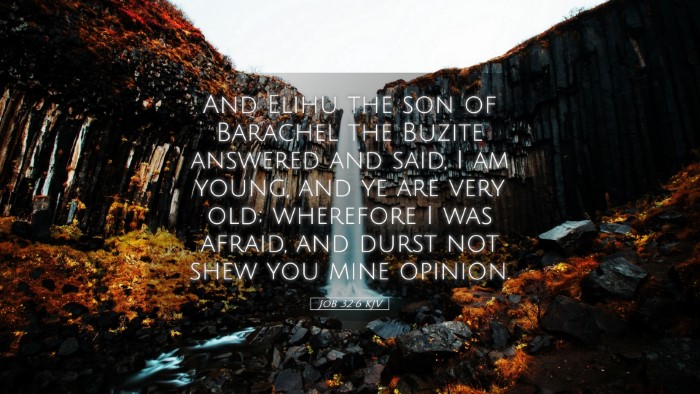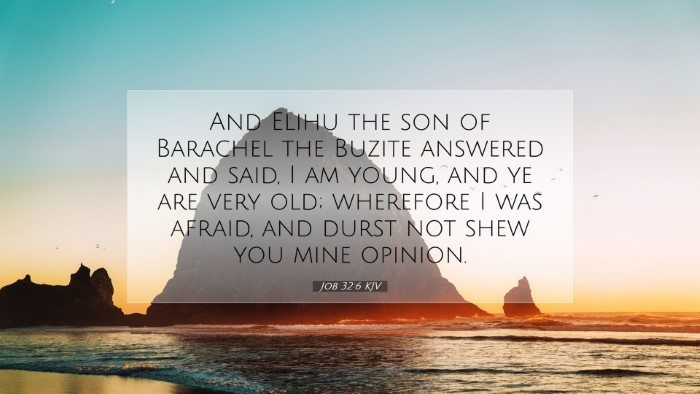Old Testament
Genesis Exodus Leviticus Numbers Deuteronomy Joshua Judges Ruth 1 Samuel 2 Samuel 1 Kings 2 Kings 1 Chronicles 2 Chronicles Ezra Nehemiah Esther Job Psalms Proverbs Ecclesiastes Song of Solomon Isaiah Jeremiah Lamentations Ezekiel Daniel Hosea Joel Amos Obadiah Jonah Micah Nahum Habakkuk Zephaniah Haggai Zechariah MalachiJob 32:6
Job 32:6 KJV
And Elihu the son of Barachel the Buzite answered and said, I am young, and ye are very old; wherefore I was afraid, and durst not shew you mine opinion.
Job 32:6 Bible Commentary
Commentary on Job 32:6
Verse Citation: Job 32:6 – "So Elihu, the son of Barachel the Buzite, answered and said: I am young, and you are old; therefore I was afraid, and dared not show you mine opinion."
Introduction
The book of Job is a profound exploration of suffering, divine justice, and human understanding. In this particular verse, we encounter Elihu, a younger man among Job's companions, who approaches the dialogue with a blend of humility and assertiveness. This commentary draws insights from various public domain sources to unpack Elihu's approach and the implications of his words for both his immediate audience and for broader theological discussions.
Elihu's Introduction and Context
Matthew Henry's Commentary: Henry points out that Elihu represents a shift in the discourse, serving as a mediator between Job and his friends. His acknowledgment of his youth signifies both respect for tradition and a recognition of the wisdom that sometimes comes with fresher perspectives. Elihu's healthily rebellious posture allows him to critique while also seeking to enlighten.
Albert Barnes' Notes: Barnes notes that Elihu's youth is significant in the context of the older friends’ failure to provide satisfactory answers. Elihu stands out because he respects the elders but is not paralyzed by their authority. He embodies a tension between respect for age and the wisdom that can arise from different experiences.
Humility and Confidence
Analyzing the Balance: Elihu's humility is evident in his opening statement. He shows a recognition of the wisdom of his elders, which is a vital lesson in communication and discourse within both academic and pastoral contexts. Yet, his confidence surfaces as he feels compelled to speak, highlighting the essential balance between humility and the conviction to communicate truth.
Adam Clarke's Commentary: Clarke emphasizes that Elihu's caution reveals a deep respect for wisdom, yet his eventual decision to speak signifies an important lesson about the necessity of addressing truth regardless of one’s age. It is a reminder that every voice has value in the conversation, especially when it seeks to clarify and uplift.
The Significance of Age in Discourse
There is a cultural and philosophical weight on the perceived wisdom of the elderly, a theme prevalent in various traditions, including biblical literature. Elihu's address challenges these presuppositions, suggesting that youthful insight can also contain profound truth.
- The Value of Diverse Perspectives: Each generation brings its own context and understanding, and this diversity enriches theological discussions.
- The Caution Against Eldership Bias: Elihu suggests that while experience is valuable, it does not necessarily preclude the youth from having valid insights.
The Role of Silence
The fear Elihu expresses regarding his youth reflects a theme of silence in the face of authority. This invites broader contemplation for pastors and leaders on the dynamics of dialogue and speaking out in the face of perceived silence.
Matthew Henry's Insight: Henry notes that silence, while sometimes necessary, can also be a hindrance in the pursuit of wisdom. Elihu’s decision to speak after due consideration illustrates the importance of speaking at the right moment despite fear.Implications for Modern Readers
For pastors and theologians, Job 32:6 serves as a poignant reminder of the need for inclusivity in conversations about faith, suffering, and the nature of God. It underscores the importance of listening to voices from all walks of life, recognizing that wisdom can indeed come from unexpected places.
Conclusion
Job 32:6 encapsulates a profound truth about communication, the interplay of age and authority, humility, and the courage to speak truth. In a world rife with complexities and suffering, Elihu’s message encourages an openness to new thoughts while anchoring them in humility and respect for those who have walked before us.
This exhortation is not just for the young but also for the old, inviting continuous dialogue across generational divides. It implores all scholars, students, and ministers to engage with one another, sharing insights and wisdom that make the collective understanding of faith deeper and richer.


